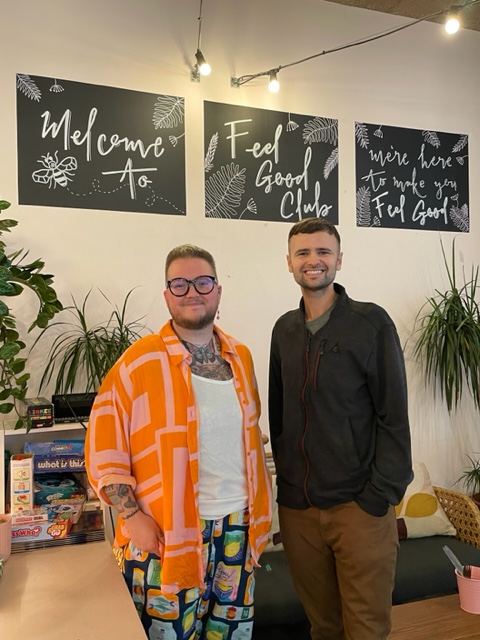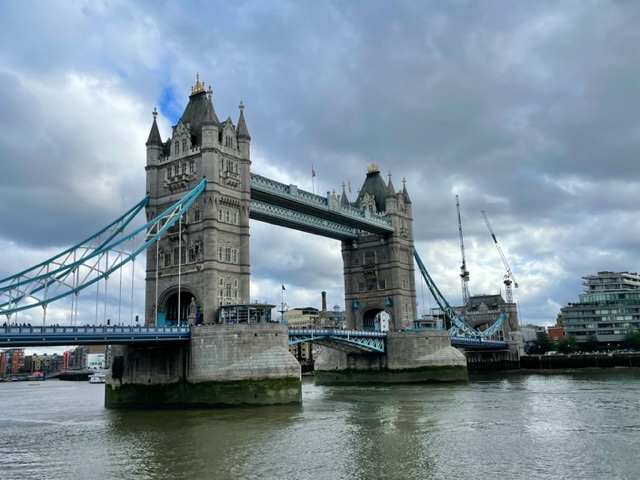Despite Britain being a relatively small island, 2 months was not enough time to explore it because it is so packed with scenic and historic destinations. I jaunted through Northern Ireland (see my Irish blog), Scotland, and England but couldn’t fit in the entirety of Wales and SW England (I’ll be back!). I was quite impressed by everywhere I passed through and really enjoyed learning a few Britishisms and soaking in the various regional accents.
Top Photo: Tower Bridge, London

Destinations
Scotland
Glasgow: Scotland’s largest city has very friendly residents and some striking modern architecture
Highlands: The northern half of Scotland is chockfull of stunning Norway-esque nature–green mountains, tall waterfalls, and lots of lochs (lakes)
St. Andrews & Dundee: One of the world’s most famous golf courses in a historic university town, with the charming riverside city of Dundee nearby
Edinburgh: Built around volcanic hills, Scotland’s capital has a ton of sweeping views, historic sites, and bustling neighborhoods to explore
England
Lake District: World-class hiking abounds in this mountainous region
Liverpool: A historic port city with a unique culture & accent and striking old & new architecture
Manchester & Peaks District: Almost every building in this city is made of red bricks and it’s teeming with uni students and fun vibes…plus it’s nearby to lovely hiking in the Peaks District.
York: A truly beautiful small medieval city
Birmingham: England’s 2nd-biggest city has impressive modern architecture and street art
Oxford & Cambridge: Two of the world’s oldest and top universities have stunning campuses to explore
Brighton: The Santa Monica of England, but grander and gayer
London: The UK’s bustling capital lies along the River Thames and took me 2 weeks to explore
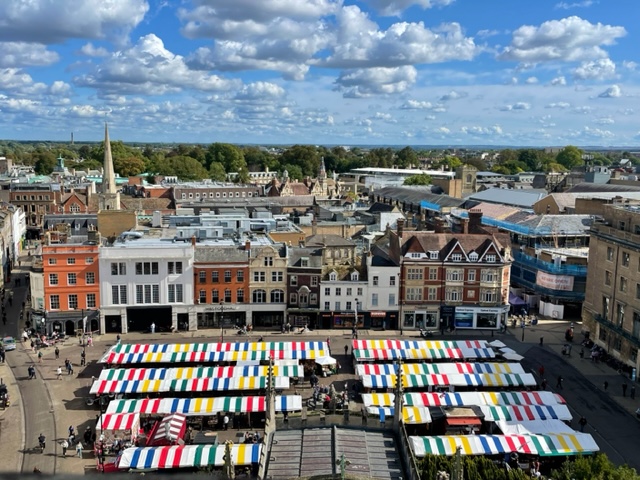
Some Stats
- The UK has a lot of the same problems as the US which share a common root of neoliberal leadership beginning in the 80s privatizing things that shouldn’t be privatized (like formerly public housing), creating a culture of blaming the poor for their own problems, and realigning up the government to benefit corporations and the rich even more than it already did
- The UK has public healthcare, but it’s underfunded and wait times can be egregious. Most British folks are as jealous of mainland Europe’s healthcare systems as we Americans are.
- Inequality is the fact of life here–the UK is almost as unequal as the US and countries that are not exactly beacons of equality like Russia, Pakistan, & Nigeria have more economic equality
- While the UK is well-known for its delightful abundance of South Asian immigrants, there are actually as many Polish as Indian immigrants here! Polish immigration absolutely skyrocketed as soon as Poland joined the EU in 2004 (mostly by folks in search of higher wages) and it hasn’t ceased since Brexit
- Despite being a country with some of the highest wages in the world, 8% of British citizens choose to live abroad! (Compare this to 1% of Americans, which is more typical for a wealthy country.) Most unsurprisingly move to the US, Australia, or Canada.
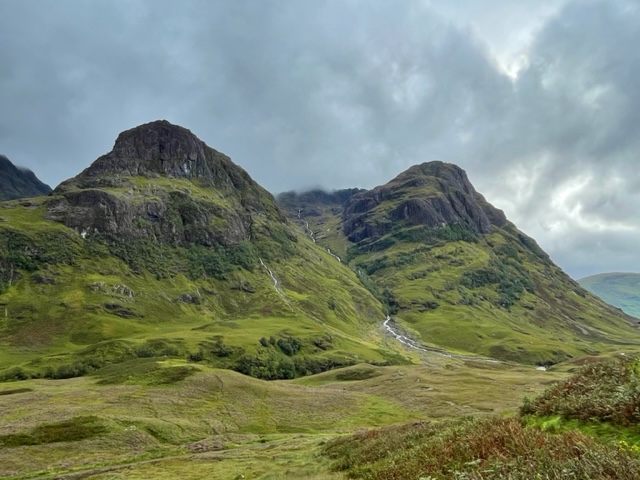
Some Britishisms
- Cut a dash – to dress very nicely
- All mouth and no trousers – an unimpressive arrogant man
- At sixes and sevens – confused
- Bob’s your uncle! – it’s easy / there you go
- By hook or by crook – by any means possible
- Spend a penny – to go to the bathroom (my favorite!)
British people also love to say “I sorted it” instead of “I figured it out” and really liberally use “lovely” “brilliant,” and “grand.” One fun moment for me was when I asked a barista in London if she had lavender or vanilla syrup to make a London Fog tea (not a known drink in London). I explained that it’s a Canadian drink but I really wanted to have it in London because of the name and she was just absolutely charmed by me and the whole situation and said “oh, that’s so lovely” about ten times in one minute hahaha (“lavender syrup, oh, that’s such a lovely idea!”).

The Milkman
Residents of British villages and small towns continue to have their milk delivered to their homes by cart, a practice that stopped in the US way back around the 1960s. I thought this was super cute and aligned well with my correct impression that British folks are obsessed with milk tea and that milk is therefore super sacred to them.
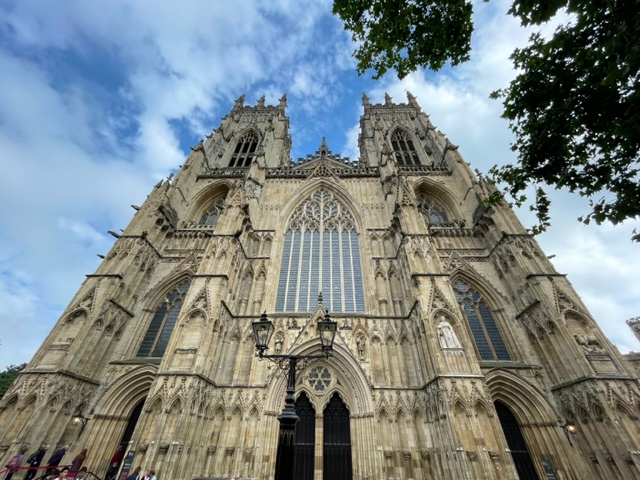
Phone Booths for Life
I’m sure you’ve seen the iconic red London phone booths and delightfully, the city has no plans to remove them even though they’re obviously not needed in the modern world. Some remain working phone booths (?!) while most are now used as little free libraries, wifi portals, produce booths, etc.

The Houses Have Names
British people love to live in small cottages with their own gardens–there are way, way fewer giant apartment towers than I saw in Korea (which pretty much only has those in most areas). And what’s even cuter: many of these homes (especially in rural areas) have names instead of addresses! For example, I couchsurfed in a home called Elmcrest in the Lake District and I saw homes named “Heather Cottage” and “Mountain View.” And yes, you literally would just write the name of the home (and the village and post code) on an envelope and it would get delivered!
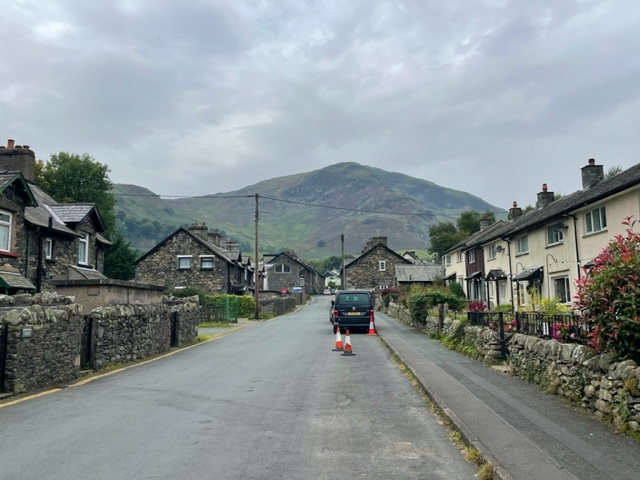
Taxi Brains
I imagine some of you have already read about this, but London taxi drivers are required to pass a test in which they prove their knowledge of every single street in the city core and they are extremely knowledgeable about landmarks, hotels, etc. And studies have proven that London taxi drivers’ brains grow as a result of this knowledge!
This is a wonderful contrast to most of the rest of the world, where taxi drivers tend to not know shit and often rely on you to navigate them with your phone, even to well-known landmarks

Domestic Abuse Prevention Starts in Preschool
I met with Jo, Campaigns and Engagement Officer for Zero Tolerance–a domestic abuse prevention org in Edinburgh–to hear about her work and get her perspective on feminism in Scotland. Some highlights of the chat:
- Zero Tolerance truly focuses solely on prevention–they don’t work with victims (there are other important orgs that do of course) and their goal is to change society to end this horrible crime
- Jo also corrected me when I used the term domestic violence as they use the term domestic abuse, since abuse can be verbal, financial, etc. as well.
- Jo is a firm believer that the roots of domestic abuse begin in childhood with the way boys and girls are socialized into gender roles and how the superiority of men is (usually subconsciously) communicated to children, which then leads to men having more power (like in the workplace) and this power creating the preconditions for abuse
- One of Zero Tolerance’s initiatives involves them asking preschools to conduct their own audit of the quantity and quality of female characters in the books they read to their pupils. These audits almost always find a glaring dearth of female representation and tends to shock the nursery educators, who thought they were doing a great job of treating kids equally and spreading positive gender messages.
- This is a brilliant tactic as I firmly believe you can’t change someone’s mind by telling them they’re wrong about something–you have to let them discover new info for themselves
- Jo also encourages day care workers to interrupt children who are performing traditional gender roles in play (like boys “working” and girls caring for dolls) and encourage them to consider other roles. The goal isn’t to forbid anything, just to encourage kids to consider new perspectives.
- One of Zero Tolerance’s initiatives involves them asking preschools to conduct their own audit of the quantity and quality of female characters in the books they read to their pupils. These audits almost always find a glaring dearth of female representation and tends to shock the nursery educators, who thought they were doing a great job of treating kids equally and spreading positive gender messages.
- Jo also shared that Scotland’s first female prime minister (Nicola Sturgeon, who resigned this year) was an outspoken and active feminist who created many government institutions and laws that improved the landscape for women here significantly (love to hear good news like this!)
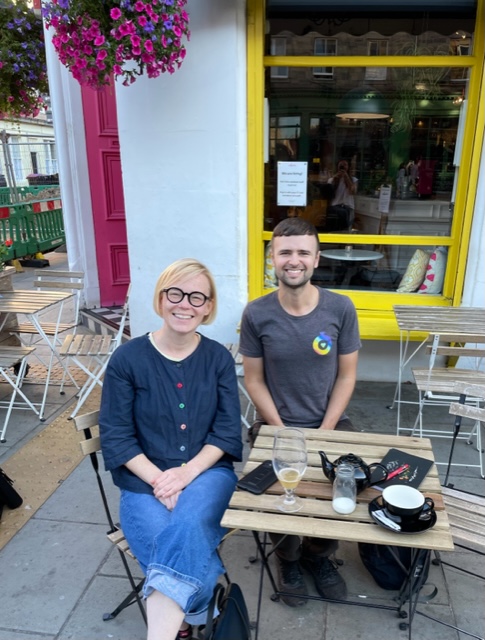
The Lavender Menace
I stopped by The Lavender Menace, a queer library in Edinburgh, to hear their story and get a sense of persistent LGBTQ issues in this relatively progressive country.
- The delightful name is actually a taking back of an insult hurtled at lesbian feminists by famous feminist Betty Friedan (The Feminine Mystique)
- The Lavender Menace was originally a queer bookstore in the 80s and a 2016 play was written and performed about the bookshop’s closing down, creating renewed interest in it and leading to its re-foundation (now as a library) in 2020 by its original founders
- The library is mostly volunteer-run and open to the public. They host open mic nights and speaker nights with queer authors
- One volunteer shared the beautiful story of how they were part of a radical trans group that sprang up and provided emergency food to anyone (without asking questions about sexuality/gender identity) during the pandemic
- The staff shared their perspective on queer issues in the UK with me. Like in the US, trans issues are the most worrying at the moment.
- TERF (trans-exclusionary radical feminism) is unfortunately way, way more prominent here than in the US. (This is the movement with which JK Rowling has become associated.)
- Even left-leaning news programs will host TERFs and talk about trans issues, without any actual trans people present–unimaginable on a left-leaning US news channel like MSNBC
- Britain has a separate healthcare system for trans folks, which is understaffed and underfunded and requires people to navigate a ton of bureaucracy. It’s normal to have a 3-year wait to even get assessed for hormone treatment.
- TERF (trans-exclusionary radical feminism) is unfortunately way, way more prominent here than in the US. (This is the movement with which JK Rowling has become associated.)
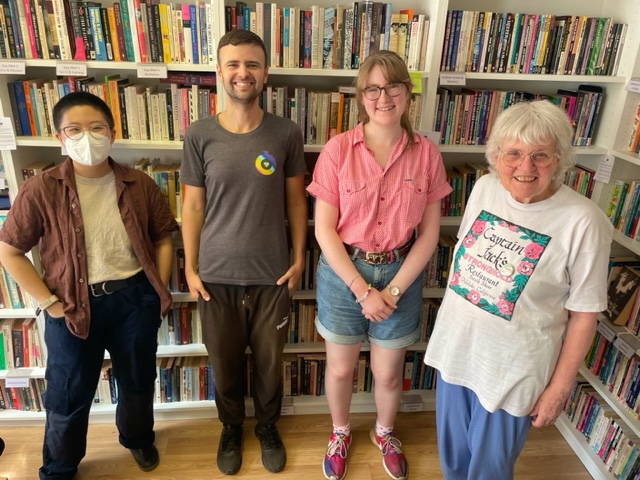
A Ton of Trans Joy!
In Manchester, I met with the delightfully chipper Jay Luiz and John Houghton from England’s national trans charity, Sparkle, to get a better sense of what life is like for trans British people in these terrible TERF times. Let’s start with some struggles:
- Police are very tolerant of TERFs (trans-exclusionary radical feminists), allowing them to hand out pamphlets saying things like “trans people are pedophiles” at Pride events. Similar anti-gay rhetoric wouldn’t be allowed.
- Conversion therapy is banned for LGB people, but the government has said it’s “proportionate” for trans people and it’s totally legal for them 😦
Happily, we spent a lot more time talking about wins for the community!
- The UK census included a sexual orientation/gender identity question for the first time in 2022! (Something the US has yet to do.) The census found that 0.5% of British people identify as trans or non-binary, but 4% refused to answer the question so the real number could be higher.
- In the days leading up to the census deadline, “what is gender identity?” was the #1 search term on Google in the UK–a sign that the question was leading people to educate themselves about this topic
- Sparkle organizes an annual Trans Joy March and creates & hands out tons of cute little signs, all of which are based on suggestions from the community
- The org receives inquiries from folks asking questions like “I had someone come out as trans at work. I don’t know what to do.” and Sparkle’s leaders happily jump on Zoom calls to talk these things through with people 🙂
Finally, Jay told me the story of someone who requested a march sign for this grandpa that said “Morning, you big old gay!” Apparently, his 90-year-old grandpa came out only a few years ago and now lives with both his longtime wife and his new partner. His wife greets him with “Morning, you big old gay!” every morning 😀
In London, I met with Lukasz Konieczka, the director of Mosaic, a queer youth center that hosts weekly workshops on queer history, art, and culture, holiday events like “Homoween,” a summer camp and a winter retreat, clothes swaps, and organized outings to queer galleries, film screenings, etc. They provide these awesome programs for free for 400+ youth every year. They currently serve 12-18 year-olds, but they’re expanding to a new program to serve 18-25 year-olds to capture folks who come out later but could still benefit from being part of the community.
